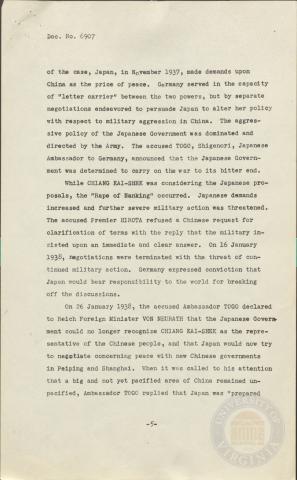
Page 5
| Parent | Doc. 6907 - Collaboration Between Japan, Germany and Italy, Volume 1 - Opening Statement |
|---|---|
| Date | |
| Language | English |
| Collection | Tavenner Papers & IMTFE Official Records |
| Box | Box 15 |
| Folder | Japan, Germany, Italy Collaboration Vol 1 |
| Repository | University of Virginia Law Library |
Doc. No. 6907
of the case, Japan, in November 1937, made demands upon China as the price of peace* Germany served In the capacity of "letter carrier" between the two powers, but by separate negotiations endeavored to persuade Japan to alter her policy with respect to military aggression in China. The aggres¬sive policy of the Japanese Government was dominated and directed by the Army* The accused TOGO, Shigenorl, Japanese Ambassador to Germany, announced that the Japanese Govern-ment was determined to carry on the war to Its bitter end.
While CHIANG KAI-SHEK was considering the Japanese pro¬posals, the "Rape of Nanking" occurred. Japanese demands increased and further severe military action was threatened. The accused Premier HIROTA refused a Chinese request for clarification of terms with the reply that the military in¬sisted upon an immediate and clear answer. On 16 January 1938, negotiations were terminated with the threat of con¬tinued military action. Germany expressed conviction that Japan would bear responsibility to the world for breaking off the discussions.
On 26 January 1938, the accused Ambassador TOGO declared to Reich Foreign Minister VON NEURATH that the Japanese Govern* ment could no longer recognize CHIANG KAI-SHEK as the repre¬sentative of the Chinese people, and that Japan would now try to negotiate concerning peace with new Chinese governments in Pelplng and Shanghai. When it was called to his attention that a big and not yet pacified area of China remained un- pacified, Ambassador TOGO replied that Japan was "prepared
